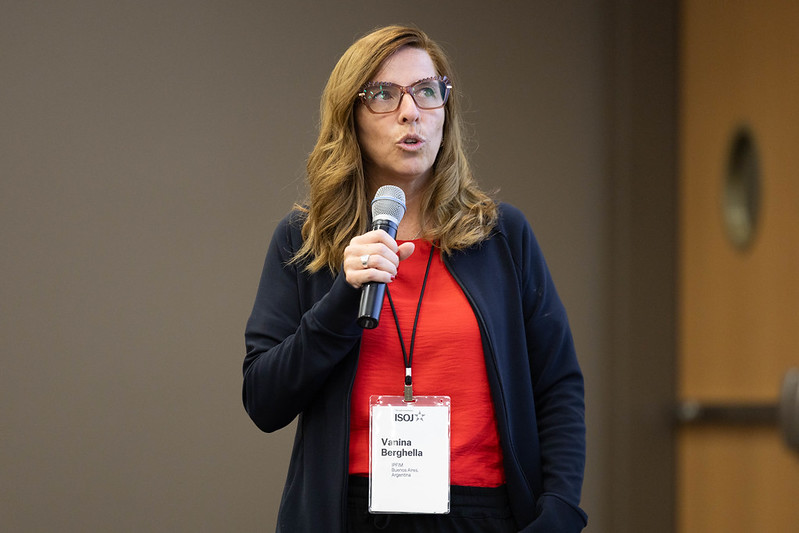List the successes and impacts of your media outlet; think about alliances with other media outlets; participating in events and showing your work: these were some of the recommendations shared by Vanina Berghella, director for Latin America and the Caribbean at the International Fund for Public Interest Media (IFPIM), at the 17th Ibero-American Colloquium on Digital Journalism. At the event held on April 14, Berghella presented the Fund's work in the region and offered suggestions for ways to seek institutional grants.
Berghella recalled that, in 2023, she was at the 16th Colloquium announcing the arrival of IFPIM in Latin America. This time, she was able to share the experience of this first year and the opportunities for media in the region.
IFPIM is a global and multilateral fund to support public interest media, defined by Berghella as media that exist to inform the public about matters that concern them; provide fact-based information in a reliable manner; are committed to the demonstrable search for truth; and are editorially independent and transparent about their processes, finances and internal policies.
According to Berghella, IFPIM's mission and reason for its existence are connected to the global crisis of media sustainability and the fact that, also at a global level, government and private funding for the media is “dramatically low.”

Vanina Berghella during her presentation at the 17th Ibero-American Colloquium on Digital Journalism. (Photo: Patricia Lim/Knight Center)
“The mission of the fund is to work on capturing these international funds, especially from governments, to be able to accompany the development of media,” she said.
“Its vision and mission is to promote the media ecosystem. Imagine a media ecosystem with financial health, but also with the strengthening of its structures in its different dimensions. In some ways, the fund appeals above all to funders to understand that without a strong and healthy media ecosystem, there cannot be strong and healthy democracies,” Berghella said.
According to Berghella, IFPIM works with two main approaches: direct help to the media and encouraging changes in the media ecosystem. In the first approach, it works with media in “crisis situations,” caused by difficulties within the outlets themselves or by the context in which they find themselves, and it works with media in more stable situations that have the possibility of growth and evolution in their sustainability.
In the second approach, support is aimed at initiatives that “allow us to challenge and improve the structures of a country's media ecosystem in the medium- or long-term,” Berghella said. One example is IFPIM's support in Brazil for the Digital Journalism Association (Ajor) in the creation of a national multisectoral fund to finance independent media.
The fund's thematic priorities, according to Berghella, are media that are trying to capture and retain young audiences; implement new technologies effectively and ethically; or build diverse and inclusive news ecosystems.
IFPIM operates globally, with special attention to low- and middle-income countries. In Latin America, the countries currently eligible for the fund are Argentina, Bolivia, Brazil, Colombia, Costa Rica and Paraguay. Ecuador soon will also be eligible, she said.
There are 11 ongoing grants in the region. Some Latin American media supported by IFPIM are La Gaceta (Argentina), Confidencial (originally from Nicaragua, but now legally established in Costa Rica), Nexo (Brazil) and Vorágine (Colombia).
According to Berghella, the fund currently accepts expressions of interest from media seeking financing, which can be made via the website, and the selection process is carried out on a continuous basis. Digital native, traditional and for-profit or non-profit media located in eligible countries can apply to be supported by the fund.
Berghella also imparted recommendations for media that apply for financing, like that offered by IFPIM.
“Know yourself well internally; Research the organization to which you are applying so as not to lose focus and not waste your time and so that we can, obviously, find better solutions for you; design flexible budgets; make your work visible,” she suggested.
The Ibero-American Colloquium on Digital Journalism is an annual meeting of journalists from the region organized by the Knight Center for Journalism in the Americas. Traditionally, it is held on the Sunday following the close of the International Symposium on Online Journalism (ISOJ) and, this year, it was held on April 14. The complete recording of the 17th Colloquium can be found here.